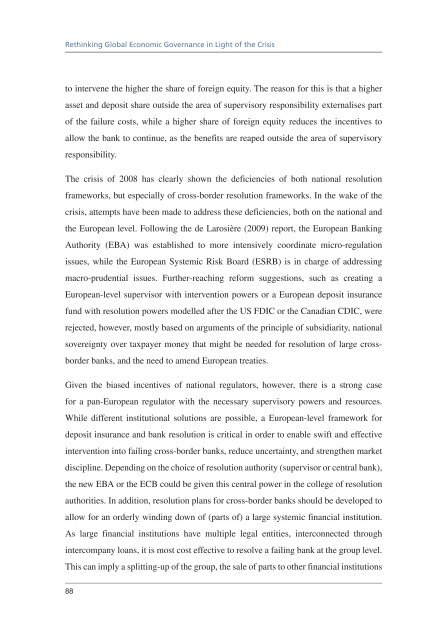Download PDF - Vox
Download PDF - Vox
Download PDF - Vox
- No tags were found...
Create successful ePaper yourself
Turn your PDF publications into a flip-book with our unique Google optimized e-Paper software.
Rethinking Global Economic Governance in Light of the Crisisto intervene the higher the share of foreign equity. The reason for this is that a higherasset and deposit share outside the area of supervisory responsibility externalises partof the failure costs, while a higher share of foreign equity reduces the incentives toallow the bank to continue, as the benefits are reaped outside the area of supervisoryresponsibility.The crisis of 2008 has clearly shown the deficiencies of both national resolutionframeworks, but especially of cross-border resolution frameworks. In the wake of thecrisis, attempts have been made to address these deficiencies, both on the national andthe European level. Following the de Larosière (2009) report, the European BankingAuthority (EBA) was established to more intensively coordinate micro-regulationissues, while the European Systemic Risk Board (ESRB) is in charge of addressingmacro-prudential issues. Further-reaching reform suggestions, such as creating aEuropean-level supervisor with intervention powers or a European deposit insurancefund with resolution powers modelled after the US FDIC or the Canadian CDIC, wererejected, however, mostly based on arguments of the principle of subsidiarity, nationalsovereignty over taxpayer money that might be needed for resolution of large crossborderbanks, and the need to amend European treaties.Given the biased incentives of national regulators, however, there is a strong casefor a pan-European regulator with the necessary supervisory powers and resources.While different institutional solutions are possible, a European-level framework fordeposit insurance and bank resolution is critical in order to enable swift and effectiveintervention into failing cross-border banks, reduce uncertainty, and strengthen marketdiscipline. Depending on the choice of resolution authority (supervisor or central bank),the new EBA or the ECB could be given this central power in the college of resolutionauthorities. In addition, resolution plans for cross-border banks should be developed toallow for an orderly winding down of (parts of) a large systemic financial institution.As large financial institutions have multiple legal entities, interconnected throughintercompany loans, it is most cost effective to resolve a failing bank at the group level.This can imply a splitting-up of the group, the sale of parts to other financial institutions88














